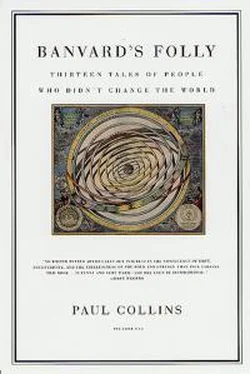These intelligent neighbors were not invulnerable, though. In Dick's time, the asteroid belt between Mars and Jupiter was still a relatively new discovery, and some hazarded the guess that it might be the remains of a planet. In Dick's thinking-since all planets were inhabited--this cataclysm becomes a
celestial Sodom: "The fate of the beings that inhabited the original planet must have been involved in the awful catastrophe. ... Nor should we consider it inconsistent with what we know of the physical government of the Almighty."
Some scientists-then, as now--fretted over the possibility of a comet smashing into the earth and snuffing out the human race. But however vengeful this planet-smashing God was, Dick could not imagine that this was the common moral state of the universe:
The benevolent Father of all did not intend that this moral derangement should be universal and perpetual. ... If a world which has been partly deranged by the sin of its inhabitants abounds with so many pleasures, what numerous sources of happiness must abound, and what ecstatic joys must be felt in those worlds where mortal evil has never entered, where diseases and death are unknown.
A good God meant that most, and maybe all, other worlds were still in a state of innocence. Perhaps, then, it was just as well that we couldn't corrupt them through human contact--a notion that has enjoyed currency among science fiction writers ever since.
In fact, Dick thought that alien intellects and morals might be far more advanced than ours. The distant and irregular motion of the outer planets would demand a superhuman mind in order to make the astronomical observations needed to appreciate God's celestial workings. Comets swooped in irregular orbits, while the inhabitants of the rings of Saturn lived on multiple rings that (by his guess) all moved at confusingly different speeds: Intelligent minds exist in the regions of Jupiter, Saturn, and Uranus. ...
Those minds, in all probability, are endowed with faculties superior in intellectual energy and acumen to those of our globe. For the rapidity and complexity of the [planetary] motion ... require the exertion of [superhuman]
intellectual faculties.
And any lunar astronomers had to surmount their initially lunarcentric view of the universe to realize that their role was twice diminished: that is, they were circling another world that was itself circling a sun. But our moon's astronomers, favored with long nights and a thin atmosphere--for Dick refused to believe that the moon lacked any air at all--could at least take solace in crystal-clear views of their earthly brethren.
Better still, he hinted, perhaps these Lunarians didn't even need telescopes to do this. Although our weak earthly eyes might not be able to view them with the most powerful instruments, aliens might have eyes that could spy upon us unaided. Dick's mind also ranged to imagining how the night might look on other planets: "The most splendid object in the nocturnal sky of Venus will be the earth. ... Our moon will likewise be seen from Mars like a small star accompanying the earth." In fact, Dick could scarcely conceive of blind or dim-eyed aliens. What else is the universe for, he asked, but contemplation by its inhabitants?
All these speculations on interplanetary vistas were easy enough to consider in the abstract, but Dick popularized a grander earthly plan. Reasoning that all alien intelligences spoke the universal language of geometry, in Celestial Scenery he proposed the construction of a gigantic geometrical figure on the plains of Siberia:
A correspondence with the inhabitants of the moon could only be begun by means of such mathematical contemplations and ideas which we and they must have in common. They might perhaps erect a similar one in reply. Schemes far more foolish and preposterous than the above have been contrived and acted
upon in every age of the world. The millions which are now wasting in the pursuits of mad ambition and destructive warfare might, with far greater propriety, be expended in constructing a huge triangle or ellipsis of many miles in extent, in Siberia or any other country.
For many readers, Celestial Scenery was their first exposure to this breathtakingly ambitious notion. But variations on this idea--using a giant array of mirrors in Siberia, say, or filling a giant square Saharan trench with kerosene and setting it alight--had been floating around for a couple of decades among similar-minded cosmologists. On a slightly more practical note, Dick envisioned a worldwide corps of thousands of astronomers, each allocated a particular part of the moon to survey for years, all in order to detect any long-term changes in vegetation or topography, either of which might indicate the urban handiwork of an intelligent race.
Even in his era, long before radio, Dick imagined that humans might contrive some better means of reaching out into the ether. "Man is only in the infancy of his being," he mused, for he knew that his monumental proposals were also monumentally unwieldy means of interplanetary communication: We may conceive that intellectual beings, to whatever portion of the material world they originally belonged, may hold the most intimate converse with one another, by modes peculiar to their economy, and which are beyond the conceptions of the physical universe; so that distance in point of space shall form no insuperable barrier to the mutual communication of sentiments and emotions.
For a few months in 1835, it seemed that Dick's celestial vision might come true.
It began quietly enough. On August 21, 1835, the New York Sun reported that astronomer Sir John Herschel "has made some astronomical discoveries of the most wonderful description, by means of an immense telescope." Hyperbole was common to newspapers of the time, so this announcement could have meant almost anything. What it did mean was revealed a day later: in South Africa, the ingenious Herschel had built a telescope so powerful that when the cap was left off during the day, it melted the plaster walls into blue glass, burned a hole through the observatory, and then set fire to a nearby grove of trees.
This insanely powerful telescope could magnify objects by an unheard-of 42,000
times, and was promptly turned at the moon the next night to reveal ... a field of poppies.
As if in an opium dream, the magical images unfolded: A beach of brilliant sand, girt with wild castellated rocks, apparently of green marble ... with grotesque blocks of gypsum, and festooned at the summit with the clustering foliage of unknown trees. We were speechless with admiration ... [Later we saw pyramids] of monstrous amethysts, of a diluted claret color, glowing in the intensest light of the sun!
If Sun readers were stunned by the news, so were the newsagents: the issue sold out, and printers scrambled to keep up with demand for it and the following issue. The Sun had scooped every other paper in the country by obtaining the latest copy of the Edinburgh Journal of Sciences, which apparently held Dr. Andrew Grant's account of the lunar discoveries. Unable to procure a copy for themselves, competing papers immediately reprinted the story. But even they couldn't have anticipated the next electrifying revelation: animal life.
The dawn of August 25 saw New Yorkers sitting down and rubbing their eyes in
disbelief. Herschel had discovered herds of small bison living on the moon.
What was more, there was a menagerie of bizarre lunar animals that almost defied earthly description:
The next animal perceived would be classed on earth as a monster. It was of a bluish lead color, about the size of a goat, with a head and beard like him, and a single horn, slightly inclined forward from the perpendicular. The female was destitute of horn and beard, but had a much longer tail. It was gregarious, and chiefly abounded on the acclivitous glades of the woods. In elegance of symmetry it rivaled the antelope, and like him it seemed an agile sprightly creature, running with great speed, and springing from the green turf with all the unaccountable antics of a young lamb or kitten.
Читать дальше











